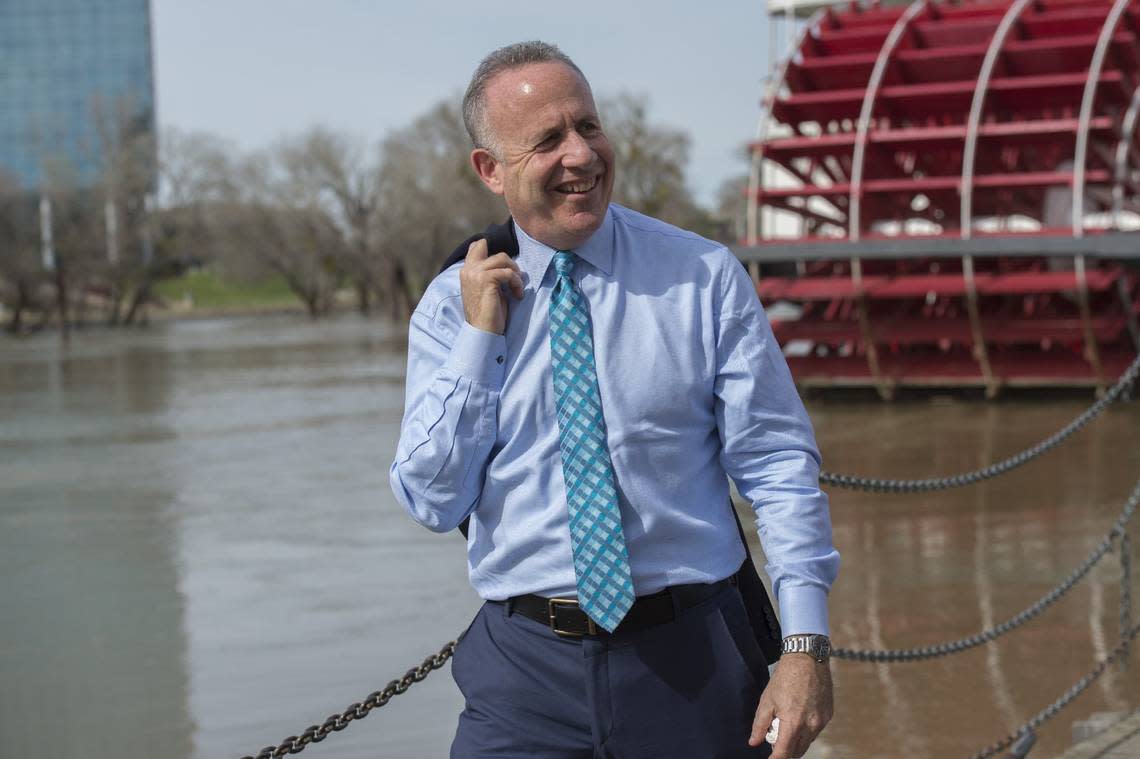Darrell Steinberg’s state legislative legacy: As a leader, he was ‘very senate-like’

- Oops!Something went wrong.Please try again later.
Before he was mayor of Sacramento, Darrell Steinberg was a Democratic lawmaker known for getting things done in the Capitol. He has announced that he will not seek re-election as mayor, leaving a legacy with the city as well as the state.
Steinberg’s legislative career began in 1998, when he jumped from the Sacramento City Council to the California Assembly.
At the time, Republican Pete Wilson was in the governor’s mansion. Over the course of his time in the Assembly (1998 to 2004) and the Senate (2006 to 2014), Steinberg would serve under two Republican governors — Wilson and Arnold Schwarzenegger — and two Democratic ones — Gray Davis and Jerry Brown.
Whether Republican or Democrat, Steinberg wasn’t afraid to “go to bat” with the governor, said Steven Maviglio, a California Democratic strategist.
“He had big ideas and he was kind of a visionary type of legislator,” said Democratic consultant Bill Wong.
As a sign of his effectiveness as a lawmaker, Steinberg in 2008 was elected Senate president pro tem, making him the leader of the California Senate Democrats.
“He was a very straight up, honest dealmaker. And I think that won him a lot of points from his colleagues because they knew where he was coming from, no agendas,” Maviglio said.
Wong described Steinberg as very diligent and collegial.
“He was very senate-like, in the sense that he was very thoughtful looking up policies, talking about policies,” Wong said.
At the time of Steinberg’s ascendance, the Senate was considered to have a diminished role in the lawmaking process, Maviglio said, until Steinberg “revived the status of the Senate as a body.”
Steinberg becoming pro tem was momentous for the Sacramento region, said former Sen. Richard Pan, a Democrat who succeeded Steinberg in office. Pan said that usually, legislative leadership positions are taken up by lawmakers from the Bay Area or Southern California.
“The fact that he took on that role of leadership in the State Senate certainly was a big deal for Sacramento,” Pan said.
Steinberg’s time in the Legislature pre-dated the Democratic supermajority that has since come to dominate it, and that meant that he needed to be able to deal with GOP lawmakers as much as he had to deal with Democratic ones.
That included working to craft a balanced budget in a time of sky high deficits.
“To be the leader in the Senate, having to negotiate essentially cuts, you have to give a lot of respect for what he was able to do,” Pan said.
At the time, the lawmakers had to pass a budget with a two-thirds vote, meaning that Steinberg had to find Republican votes to get the budget done.
“Not only did you have a Republican governor but you had a Republican minority that could hold up the budget process,” Pan said. “...God bless Darrell Steinberg. To have to go through all of that and still choosing a leadership position.”
Steinberg was perhaps best known for getting Proposition 63 on the 2004 ballot. That ballot measure called for a 1% tax increase on the state’s wealthiest residents to fund mental health services in the state. It passed with 53% of the vote.
“He really championed that issue, very dedicated to it,” Maviglio said.
Other legislative accomplishments include gaining a California Environmental Quality Act exemption for the Sacramento Kings arena, passing legislation to protect water supplies, and helping to reform the state pension system, Maviglio said.
Throughout his time in the Legislature, Steinberg had a hard time saying “no” to people, according to Maviglio.
“Darrell if nothing else is one of the nicest guys on the planet,” Maviglio said. “...One of his faults is that he likes to say ‘yes’ to everybody.”

